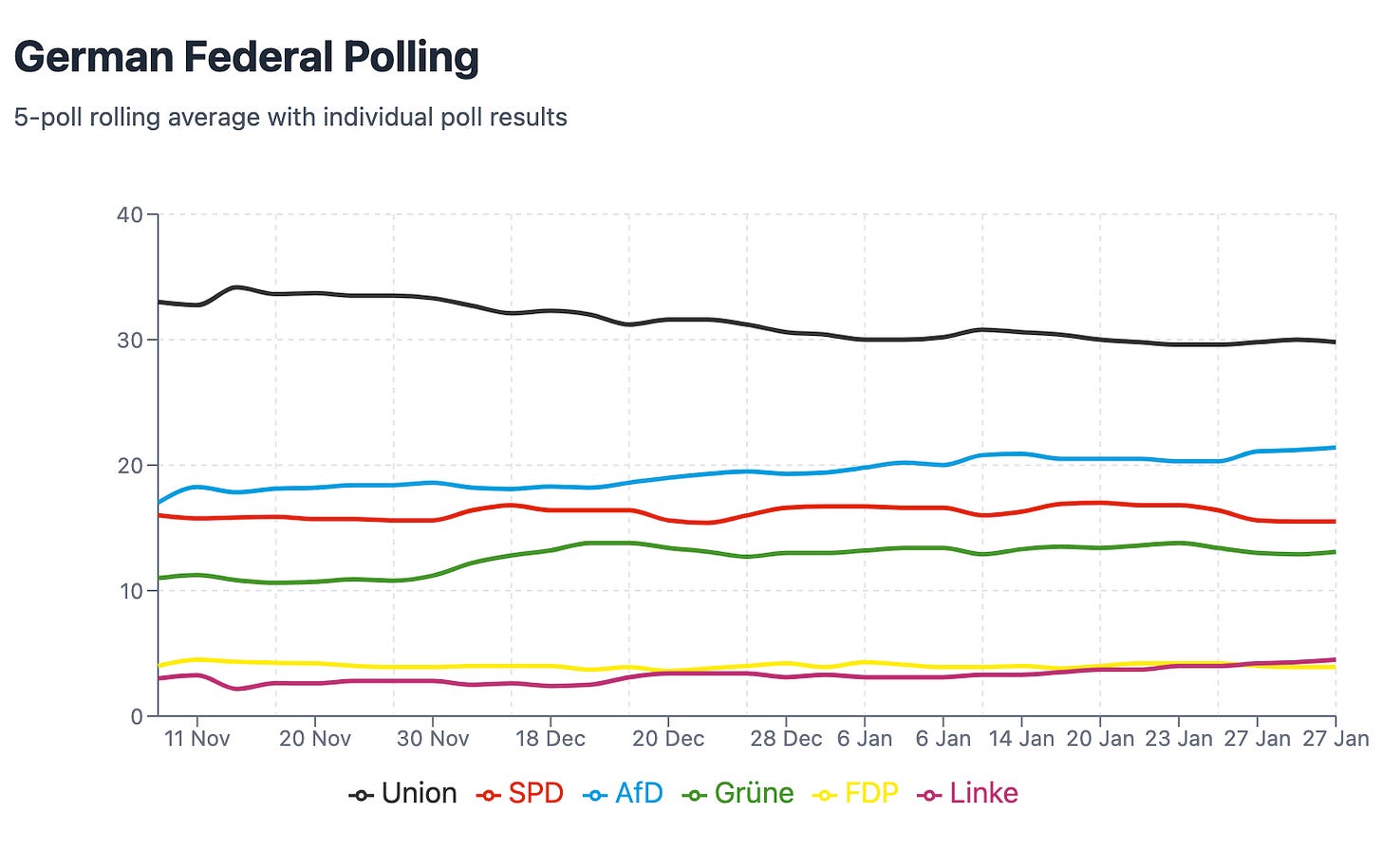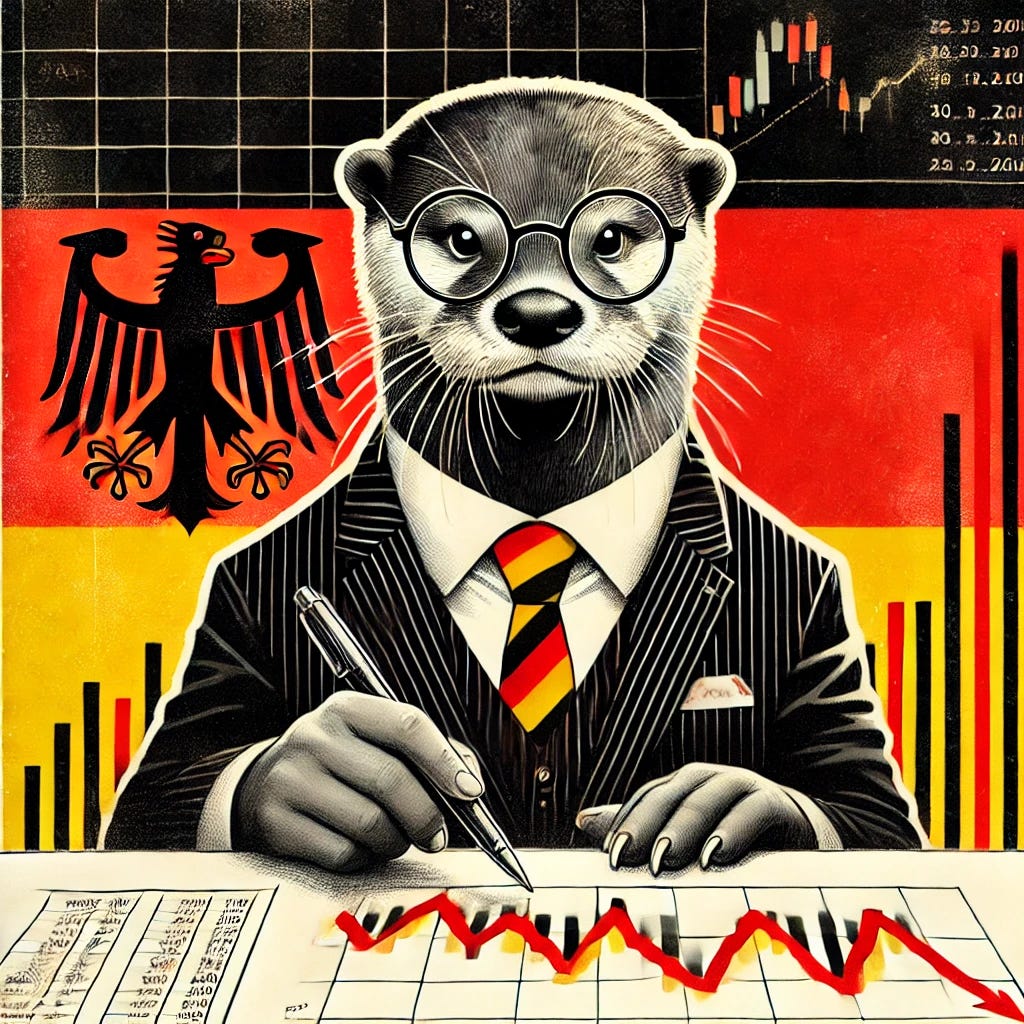Cartel Politics Has Strangled Germany
Or how Germany fell out of love with consensus
Throughout the 2010s, Western press outlets couldn't publish enough puff pieces about how Berlin was getting everything right that London, Paris, and Washington were getting so badly wrong. Books like "Why the Germans Do It Better" graced the shelves of centrist dads everywhere.
Why couldn't Britain have a stable political system like Germany? Why couldn't it be as internationalist or outward-looking? Why couldn't it have preserved its industrial base? Why couldn't its leaders display an ounce of Merkel's dignity?
Well, the grass is always greener, and Germany has spent the 21st century building its economy on sand. Now it's crumbling.
The scale of Germany's decline is striking. The economy that seemed immune to recession after the financial crash has ground to a halt. GDP contracted by 0.2% last year and 0.3% the year before. The Bundesbank predicts anaemic growth of just 0.2% for this year. The "tolerance" that Western liberals celebrated has given way to the same tensions over immigration that beset their Western allies.
The vaunted political stability is also history. Olaf Scholz's "traffic light" coalition collapsed late last year amidst infighting over the budget. As voters head to the polls on February 23rd, it's the extremes that look set to make the most progress.
The Christian Democrats (CDU) lead in voting intentions; whatever configuration the next government takes, it will almost certainly be CDU candidate Friedrich Merz who takes the Chancellery. But Germany's electoral system means he can't govern alone. The far-right AfD has surged to second, while Scholz's Social Democrats (SPD) have plummeted to third place. The libertarian Free Democrats face complete ejection from the Bundestag. Only the Greens have maintained their 2021 position among mainstream parties, while the BSW promises the far left's best result in decades.
Amidst the chaos, you're more likely to find newspapers like the Financial Times criticising Germany these days than praising it. To Western liberals, Berlin has become an embarrassment — too timid on Ukraine, too reluctant to shoulder its share of Western defence burdens.
Some blame lies with the traffic light coalition and Scholz's timid leadership over the past three years. But Germany's failures stretch back more than 20 years through the wilful ignorances of chancellor after chancellor. Reversing the stagnation requires accepting that stability, at least for now, is gone. The CDU and Friedrich Merz must embrace radical action, or extremists and enemies of democracy will do it instead.
How Did Germany Get Here?
The very foundations that made Germany a liberal darling contained the seeds of its downfall. I think three factors stand out most of all. First, an artificial over-reliance on exports, sustained through cheap Russian energy imports and a cosy relationship with China. I say artificial because these dependencies were never sustainable despite the political class's wishful thinking. Second, chronic underinvestment in digital infrastructure that has left the country trailing its peers. Third, a political establishment too comfortable with business elites and itself, breeding stagnation that stifles innovation.
These structural problems have compounded over time, exacerbated by the choices of leaders from Schröder to Merkel to Scholz.
German industry's long dependence on autocracy was a choice, but it was politicians who chose not to address the problem until it was too late. Prior to the war in Ukraine, some 55% of German gas imports came from Russia through pipelines. Now, the country must rely on far more expensive liquid natural gas imports from countries like Norway. German wholesale gas prices are as much as four times higher than in the United States.
Germany’s industrial decline is stark. Manufacturing output has fallen 10% below pre-pandemic levels. A survey by the Association of German Chambers of Industry and Commerce found that 37% of firms were considering relocating abroad, almost double the number from 2022. A slew of iconic German companies including Volkswagen and Mercedes-Benz, chasing cheaper energy, have accelerated investments in the US
And it isn't just Russia either. China presents similar risks. Over 46% of German firms rely on Chinese inputs for their supply chains and the country has been a key export market for German products.
Yet Chinese manufacturers are rapidly eroding German advantages – BYD - Chinese car company - now outsells German brands domestically. Chinese automakers exported 5.7 million vehicles in 2024, dwarfing Germany's 1.2 million. Despite these warning signs, German firms invested a record €7.3 billion in China in the first half of 2024 alone. Just as with Russian gas, economic rationality provides little protection against geopolitical leverage.
You simply cannot run a 21st-century state without 21st-century technologies.
The state of German digital infrastructure is another canary in the coal mine that has been prematurely dismissed. Too often the technologies of the present are still regarded as the technologies of the future, and this is reflected in the statistics. Only 35% of German households have access to gigabit-capable internet compared to an EU average of 65%. The country's 5G rollout has been slow and mobile signal is patchy outside of major cities.
Partly the problem is bureaucracy which adds years to the construction of projects like data centres. Government investment in infrastructure is lower than peer countries too, standing at 2.6% of GDP compared to 3.2% in the UK and 3.8% in France. But there's also a significant skills problem: young Germans have less access to digital education than others in the OECD, in large part because computer skills are not a priority in German education policy.
You simply cannot run a 21st-century state without 21st-century technologies. It is an indictment of the German polity that it is the world's fourth-largest economy and yet it is nowhere to be seen in internet services, artificial intelligence, or electric vehicles.
Cartel State
At the heart of these problems is the cartelisation of German politics. Too many "grand coalitions" between the mainstream parties have left no release valve for opposition. When legitimate grievances find no outlet in mainstream politics, they inevitably flow to the extremes like the AfD and the BSW. Since 2005, Germany has spent 12 of 19 years under these grand coalitions between the CDU and SPD – a political arrangement that makes meaningful opposition impossible. After all, how can you effectively oppose policies you helped create?
The consequences of this cartel mindset have been devastating. The incestuous relationship between German politicians and business elites has created a moral vacuum where terrible decisions flourish unchallenged. When Russia invaded Crimea in 2014, Merkel didn't just maintain economic ties – she doubled down, pushing ahead with Nord Stream 2. While Moscow bombed Syrian hospitals and conducted assassinations on British soil, Berlin responded by... shutting down nuclear plants and deepening its dependence on Russian gas. The political establishment's capacity for self-delusion would be almost impressive if it weren't so catastrophic.
It's no surprise that the AfD now commands 20% in national polls, up from 10% in 2021. The mainstream parties' response to this surge – forming ever broader "anti-extremist" coalitions – perfectly encapsulates their inability to learn. When Social Democrats govern alongside Christian Democrats who govern alongside Greens, who exactly is left to articulate alternative visions? The answer, increasingly, is extreme parties who promise to burn the whole rotten system down.
German companies aren't entirely to blame for their Russian gas addiction or growing Chinese dependencies. They're the spoiled children of a political class that has consistently prioritised protecting incumbent industries over strategic sense, comfortable consensus over necessary conflict. A political class that has proven pathologically unable to say no to large domestic firms, even as those interests made Germany dangerously reliant on authoritarian regimes.
The same political sclerosis helps explain why Germany missed the digital revolution. While America's creative destruction reshaped industries, Germany's political-industrial complex remained wedded to defending old champions. Innovation requires disruption, but disruption threatens the carefully balanced interests of Germany's consensus politics.
The result? A political establishment that spent two decades treating digitalisation as someone else's problem while jealously guarding the industrial status quo.
The Way Forward
Germany's political class faces a stark irony: their pursuit of stability has become the greatest source of instability. The political-industrial complex that drove post-war prosperity now actively prevents its renewal. Real reform requires dismantling the consensus machine that created these crises in the first place.
Take the debt brake, every economist knows it needs axing. Germany's infrastructure gap demands billions whilst roads crumble and digital networks lag. Yet the current debate focuses on accounting tricks and special funds rather than honest reform. Why? Because real change would upset the careful balance of interests that defines German governance. The CDU claims fiscal virtue while the economy demands investment, and the result is paralysis masked as prudence.
The digital failure follows the same pattern. Germany doesn't lack the resources to modernise its economy. What it lacks is the political will to challenge established interests. Real digital transformation would threaten too many cosy arrangements – from regional politicians protecting their fiefdoms to incumbent firms comfortable with analogue processes. So instead voters get piecemeal initiatives and endless consultations while Germany falls further behind.
The CDU claims fiscal virtue while the economy demands investment, and the result is paralysis masked as prudence.
I think the real at next month’s election isn't whether Merz can form a stable coalition or whether the AfD can be contained. It's whether Germany's next government will finally break with the consensus politics that created this mess. That means no return to a grand coalition with the SPD. It means letting failed firms fail instead of protecting them with subsidies. Above all, it means accepting that some interests will lose out in necessary reforms.
The alternative is already visible in polling data. The rise of the AfD and BSW goes beyond immigration concerns, it represents a growing belief that the entire post-war German model is broken. Unless mainstream parties can deliver real change, voters will increasingly turn to those promising to burn the system down. The tragic irony is that by trying to preserve stability at all costs, Germany's political class is making radical upheaval more likely.
What would real reform look like? Start with ending the fiction that balanced budgets always equal fiscal responsibility. Reform the debt brake honestly and openly to allow investment in Germany's future. Take on the bureaucratic empires that add years to infrastructure projects. Break up the cosy relationships between politicians and industry that stifle innovation. Build a fundamental challenge to the failed consensus.
The CDU's lead in polls gives Merz a chance to be radical in defence of democracy. But if he chooses instead to preserve the consensus model, he'll merely be managing decline while extremists gain strength. Germany's political establishment kept the peace through consensus for decades after the war. Now that same consensus threatens to unravel everything they built.
Thank you for reading Otters and Insights, if you’ve enjoyed this piece then please consider subscribing, it’s free and you have nothing to lose except a tiny portion of your life. You can find me on BlueSky @jackrowlett.bsky.social





